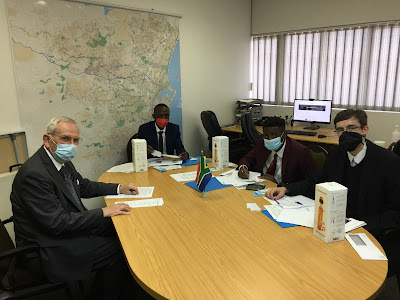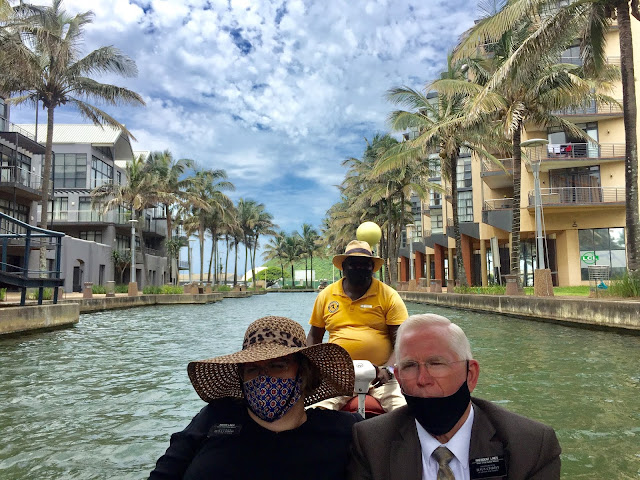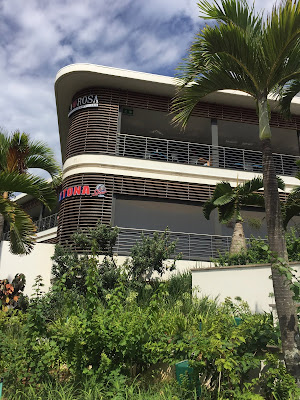New Elders in our Durban MTC
Sue made this sign this week. In the ''old days'' before COVID, all missionaries spent at least three weeks in one of the Missionary Training Centers someplace in the world -- there are 14. Those learning a foreign language would stay another five to eight weeks for intensive language study. Those coming to Durban would generally go to the Johannesburg MTC before joining us in Durban. But, for the last ten months, all MTCs have been closed. Missionaries in the USA and other developed countries do their MTC online from their homes. But many African missionaries do not have Internet at home, so now we provide the MTC training remotely from our office. They come to the Mission, but spend those three weeks in our Conference room from 10AM to 5PM every day online with Johannesburg MTC teachers.
How many new Elders are we getting? President Lines says he knows the count only when they show up at the airport. In the ''old days" we knew two to three months in advance. Four Elders arrive on Monday this week. They are all South African. We were also "supposed" to get nine more -- two from Sierra Leone, two from Uganda, four from Zambia and four from the US. Those from Sierra Leone and Uganda had their visas denied. South Africa is afraid they will come and not go home because their countries are in upheaval. From the US, the visa applications are just taking forever -- none issued that we know of since last March (2020)! The Zambian Elder started his MTC in the Lusaka Zambia Mission, but his visa came through on Thursday, so he is flying to us on Monday, along with one other Zambian Elder who has been serving there in his home country since May waiting for his visa. It looks like the logjam may be finally breaking up!
Then she hands them over to Ken. He gives them their Missionary Support Fund ATM card and explains how it works. All missionaries and/or their families and/or their congregation pay into a world-wide missionary support fund. Because a mission in Africa or South America costs a lot less than a mission in Tokyo or London or New York, the amount contributed is the same anywhere ($400 USD), but those coming from poor countries are often subsidized if needed. Then every missionary in one mission receives the same amount on his/her MSF card each month. In Durban it's about $150/month. That pays for food, transportation, and other personal necessities. The mission provides apartments and utilities and phones.
President Lines was thrilled at this batch of new Elders because all four of them have a driver's license! We've mentioned before that when the foreign Elders went home last March/April for awhile the mission was left with forty vehicles and only five drivers. As a result dozens of vehocles have sat in remote, inaccessible locations, and batteries have gone irretrievably flat and have all had to be replaced.
Our new Elders are all settled into their learning, and we enjoy having them in the office -- it's not so quiet. When they have breaks they come in and say hi to us. They are four nice young men who are unselfishly giving up two years in the prime of their young lives to come to a new city and teach people about Jesus Christ and his restored church. Two are Black, two are White. There was a time in South Africa where that couldn't have happened. But now they are all great friends working together for a common good, and being part of a new generation that can know and value each other across races.
Critters in our Lives
This week's monkey story: Sue spent a couple of days shredding old papers and filling garbage bags with chits. When Ken hauled the trash to the barrels in the carport under the building, he surprised a troop of native vervet monkeys feasting on the remains of the new missionaries' pizza lunch they had pulled from the barrel and spread all over the floor. So he shooed them off so he could clean up the mess. All fled, except one big bull monkey. He just sat back about ten feet away and stared angrily while Ken picked up the trash, stuffed the barrels with bags of clippings and put brick weights on the barrel lids. The little big guy was not happy, but he finally slunk off down into the thick jungle in the gulch below our office.
But monkeys got their revenge. Sunday afternoon on our walk, we discovered that the neighborhood monkey troop had raided the trash barrels at our apartment building and had pulled out our own trash bag and spread it all over the grounds. We picked it all back up.
We know we have a gecko living in our flat, but we haven't managed to get a picture of him. We glimpse him in the back of the kitchen cupboards, and one time running along the wall and hiding behind a picture. But this week Ken did get a photo of a gecko just outside our front door. They are considered good luck, so not to be bothered. They eat spider and cockroach eggs. Yea!!
That was its mistake. Out in the open Ken gave it a good dose of bug killer and Sue covered it with the container, and we let it die. Then Ken did the research. It's a smokybrown African cockroach. Ken took this photo with a pen so you can see how big it was!
Electrical Connectors
Ken also took a photo of one of the small waterfalls that drain the little jungle canyon. It was pretty small then. A couple of days this week we've had huge rainstorms and then there is quite a spill over this little hill.
 The canal is lined with beautiful new buildings that have businesses on the ground floor and apartments above.
The canal is lined with beautiful new buildings that have businesses on the ground floor and apartments above. We had wanted to go back to the 415 Mexican restaurant (named for San Francisco phone area code) but it has permanently closed due to COVID. Sue found another Mexican restaurant about 5 km (3.4 miles) up the beach from downtown Durban. President Lines suggested we go there for lunch one day and find out if it was an OK neighborhood to visit for dinner. (Some places are not.) It was beautiful, delicious, and quite safe. It's is part of Sun Coast Hotel/Casino/Mall complex. You have to go through a security guard to get into the parking lot, and you do not have to go through the casino to get to the restaurants. Perfect!
And the food was great! We shared a large nachos platter. The guacamole was just right. Ken and Sue and Sister Lines had different kinds of burritos, served wet -- with sauce and cheese on top. President Lines had two enchiladas with rice and beans. We all declared it wonderful and will definitely come back. We sat outside on the deck with an ocean breeze blowing around, so felt COVID-safe, too.






















































